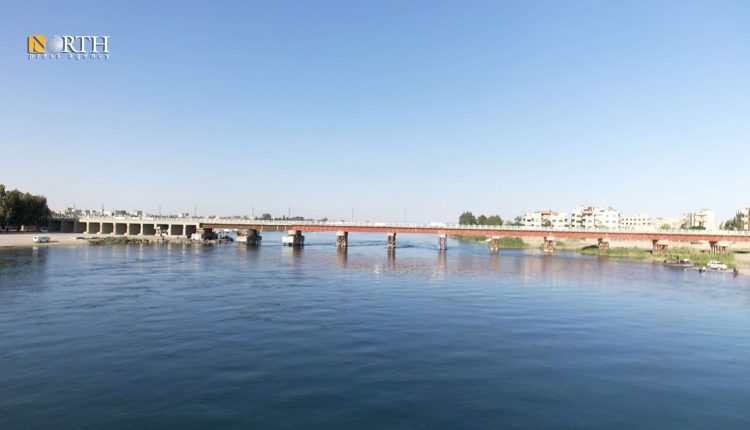By Omar Abdurrahman
DEIR EZ-ZOR, Syria (North Press) – “Every time I go fishing, I return empty-handed,” says Abu Mohammad, a fisherman from eastern Syria. His words reflect the harsh reality facing many who once relied on the Euphrates River as a primary source of livelihood.
The Euphrates, one of Syria’s most important rivers, was once abundant in fish and natural resources. But in recent years, it has suffered severe degradation due to industrial and agricultural pollution, a sharp drop in water levels driven by climate change, and the effects of political conflicts, according to local fishermen in Deir ez-Zor.
Pollution and declining catches
Speaking to North Press, Abu Mohammad notes that the water quality in the Euphrates has deteriorated dramatically in recent months, resulting in mass fish die-offs and drastically reduced catches. “We no longer find fish like we used to. I return from fishing trips with nothing,” he says.
The combined impact of polluted water, dead fish, and declining river levels has turned his once dependable trade into a daily struggle. He is now seriously considering abandoning fishing altogether in search of another job.
“Fishing used to provide enough to meet my family’s needs. Now I can no longer rely on it,” he adds, urging authorities to take immediate action to save the river and protect the livelihoods of those who depend on it.
Vanishing fish species
Other fishermen share similar stories. Mazen al-Najm, a fisherman in Raqqa, says: “Years ago, the river was teeming with fish. We could catch large quantities every day. Families depended on us. Today, the water is polluted, fish are rare, and sometimes we come back with nothing.”
He explains that some species have completely disappeared. “We used to catch plenty of carp, but now it’s rare. The few fish we do catch appear sick or weak.”
Aboud al-Harhout, a fish vendor for the past ten years, says the drop in water levels has drastically affected his business. “We used to receive large amounts of fish daily. Now it’s barely anything, and high-quality fish are almost nonexistent.”
He adds that prices have surged, and most people can no longer afford to buy fish as they did before. “Fishermen are struggling, and so are we, the vendors.”
Climate change and conflict
Oweid Tarif, a senior official at the Directorate of Environment in Deir ez-Zor of the Syrian Transitional Government, highlights the scale of the crisis. “We are facing serious challenges due to climate change and conflict. The river’s water level is falling, and waste dumped into it is increasing pollution.”
He says efforts are underway to reduce contamination and improve water levels to help revive the river’s ecosystem. “This requires collective effort. Everyone must work together to preserve this vital resource.”
Tarif stresses that declining water quality and levels are putting the lives and livelihoods of fishermen and their families at serious risk. He calls on both the government and the local community to join forces to protect fish stocks and ensure sustainability for future generations.
In recent years, Syria and Iraq have suffered widespread droughts caused by a significant reduction in water flows from Turkey. This has led to both economic hardship and public health issues across the region.
Observers warn that the continued pollution and falling levels of the Euphrates threaten not only the region’s ecosystem but also a vital source of income for thousands of Syrians. What was once a reliable and dignified profession has now become a vanishing trade, incapable of ensuring even the bare minimum of survival.

